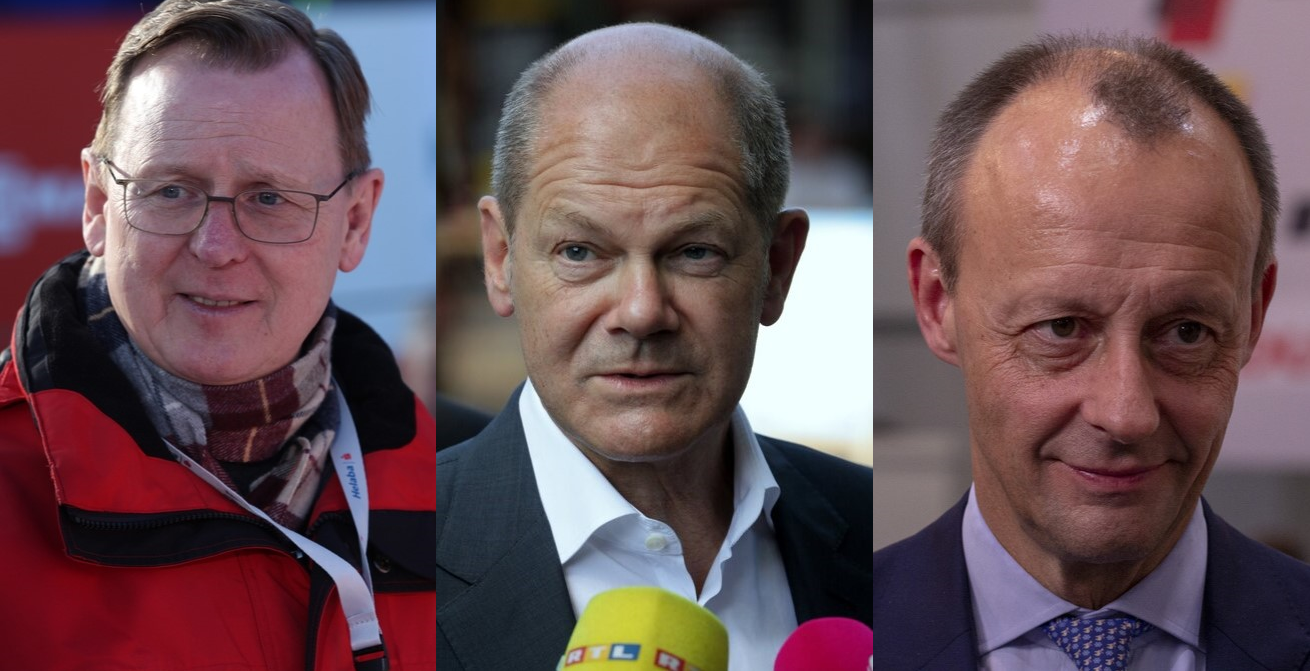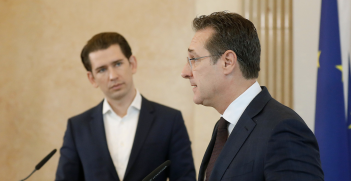The German Question in 2024: Zeitenwende, Leitkultur, or Simply Gesamtdeutsch?

The political, economic, and social dilemmas Germany faces in 2024 require unambiguous national leadership ‒ something neither Chancellor Olaf Scholz nor opposition leader Friedrich Merz has provided in public discourse throughout 2023. On the other hand, Left Party state premier Bodo Ramelow continues to put his finger on unreconciled national divisions that require attention from national leaders.
In the German language, the flexibility of compound nouns allows speakers to weave all manner of correct and curious confections into daily conversation. Faultier (“lazy” plus “animal”) is the proper German word for “sloth,” while Kummerspeck (“sorrow” plus “bacon”) is a slang term for excess weight gained by comfort eating.
Rhetorical compounds were also used in German politics throughout 2023 ‒ evocative, evasive, and sometimes even accurate. Chancellor Olaf Scholz’s Zeitenwende can be translated as an “era of epochal change,” the word inevitably recalling the Wende of 1989 ‒ “the change” or “turning point” when the Berlin Wall came down. The word Leitkultur, prominent again thanks to opposition leader Friedrich Merz of the Christian Democratic Union (CDU), combines normative “guiding culture” with supposedly self-evident “common culture.” Meanwhile, a passing reference to gesamtdeutsch by Left Party state premier of Thuringia Bodo Ramelow means simply, yet suggestively, “all-German.”
Zeitenwende and Leitkultur typify the mix of idealism and political pragmatism purveyed by Germany’s major party leaders as they worry about the resurgence of the far-right Alternative for Germany (AfD) party, Germany’s vulnerability to Russia, and the future of their country’s no-debt dominance of fiscal Europe. Ramelow’s gesamtdeutsch refers to the unachieved unity of East and West Germanies over the long term, and is an adjective loaded with the expectations and aftermath of 1989, the year of great changes leading to reunification in 1990. In 2024, stirring keywords will no doubt be used again by the leaders of Germany’s major parties in the leadup to European elections in June and federal elections in 2025. But are they useful in providing answers to the political, economic, and social questions Germany and Germans face today?
Zeitenwende
Zeitenwende was named German word of the year in 2022 after Scholz used it to describe the implications of Russia’s invasion of Ukraine. Scholz then used the word as his touchstone in an essay published in Foreign Affairs at the start of 2023. Entitled “The Global Zeitenwende: How to Avoid a New Cold War in a Multipolar Era,” this essay blends German obedience with internationalist ardour in a flowing journalese. Condemnation of Russia’s aggression provides Scholz with an implicit moral framework as he tells readers that this “epochal tectonic shift” has put an end to the “unprecedented level of connectivity and cooperation” that characterised the “three decades since the Iron Curtain fell.” Scholz claims “Germans are intent on becoming the guarantor of European security that our allies expect us to be.” But this august intention seems unlikely to carry Germany politically into the future between procrastination on defence spending (raising to two percent of GDP) and uncertainty over who Germany should call its most important allies ‒ America, France, the Weimar Triangle of Poland, France and Germany, or the Normandy Format of France, Ukraine and Germany ‒ not to mention what nation-state allies should expect of a Germany that is intent on staying supranationally at Europe’s helm.
Scholz concludes that a “mindset” and “tools” need to be developed, proceeding via “new partnerships, pragmatically and without ideological blinders.” But he also displaces initiative and efficacy from the sphere of his government’s national responsibility, suggesting instead that Germany will best flourish and contribute via rules-abiding and normative non-nationalism: “For its part, Germany is doing everything it can to defend and foster an international order based on the principles of the UN Charter.” If this is Germany’s Zeitenwende approach to Russia’s invasion of Ukraine, it is lacking in both clarity and purpose. Such non-committal multilateralism is no more likely to stimulate effective international cooperation today than it did at the time of the 1994 Budapest Memorandum ‒ when the United States and its allies made half-promises that were broken on the “shoals of Ukraine.” Thirty years later, Scholz has not spelled out how an EU-focused Germany will under his coalition government make an authoritative contribution to a UN-framed “international order” – a contribution that will come to terms with the obdurate geopolitical bases of the Russia-Ukraine war. Stationing German troops in Lithuania may be a tangible commitment to containing Russian expansion, but this national defence realism is the opposite of the peaceable, non-nationalist aspiration expressed in the title of Scholz’s essay, the imperative “to avoid a new Cold War in a multipolar era.”
Leitkultur
One reason why rhetorical non-nationalism will not provide German political leaders with the political “mindset” or “tools” to manage a period of epochal change can be found in keyword number two: Leitkultur. This term sparked controversy in 2000 when it was used in relation to migration and multiculturalism by Merz. In 2023 Leitkultur was back thanks to a migration policy paper released by the CDU in November, with Merz now leading a party in opposition after 16 years of chancellorship under Angela Merkel. Consonant with the EU’s new migration realism, the CDU’s policy paper indicated a turn away from Merkel’s selective magnanimity toward a euphemistic pragmatism regarding who should be allowed into Germany, and how asylum seekers should be managed within the EU more broadly. This pragmatism comes at a time when the CDU is realising it needs to compete in earnest with the anti-asylum AfD party, now polling at record heights.
Leitkultur rhetorically harmonises the difficult national history underlying the CDU’s migration pragmatism, and thereby avoids facing that national history realistically with political authority. The German verb leiten (“to lead” or “to guide”) perhaps gives the impression of reasonable management that is not authoritarian, as against the German verb führen (“to direct” or “to control,” but also “to lead” and “to carry out”), from which the noun Führer comes. With or without the aid of Leitkultur, it would certainly benefit the CDU to guide voters away from the AfD. Electorally, the task for the CDU in opposition is to convince German citizens that it is the CDU who can best sustain their superior life chances at a time when “social decline at the heart of Europe” has replaced the upward mobility of the post-war Aufstiegsgesellschaft ‒ another airy compound suggesting an “achievement-, promotion- and education-oriented society,” that was extolled in the face of Cold War political realities by German President Gustav Heinemann in 1969.
Compounds such as Zeitenwende and Leitkultur are rhetorical attempts by the major parties to convey something distinctive about their own capacities for national leadership while also distinguishing themselves from the taint of nationalist exclusion purveyed by other parties (named or not) that thrive on reacting to the arrival of outsiders at the gates of “Fortress Europe.”
But rather than projecting an image of reasonable authority, these attempts to dissolve national anxieties into aspirational talk tend to stimulate keyword inflation – too much rhetoric chasing too few results. If the leaders of Germany’s major parties want to give their voters a tangible sense of political authority, they will need to reconcile the airy aspirations of their Zeitenwende and Leitkultur with the real national disunity still present in Germany, despite the three decades of “connectivity and cooperation” that Scholz says have followed the Wende of 1989.
Gesamtdeutsch
Rather than dodging reality by means of globalist or culturalist keywords, Ramelow made passing reference to the word gesamtdeutsch in an interview in July 2023 while discussing some basics that continue to shape German social and economic life. Ramelow focused on persistent national problems in public education and health, and suggested listeners put aside the idea that the rising popularity of the AfD is an East German problem. While the three decades since 1989 had certainly produced a Germany that is economically strong and successful, Ramelow said the country’s psychological unity remains terribly damaged (Totalschaden erleidet ‒ a strong expression suggesting a “total loss” or “write-off”).
For Ramelow, gesamtdeutsch progress ‒ from fundamentals of public education and health care to the development of non-polarising asylum policies ‒ will come neither from supranational economic liberalisation nor from ambiguous guiding values, but from the synthesis of political accountability and service to the public good that together constitute responsible government. Moving into 2024, the task for the leaders of Germany’s major political parties is not to invent a word for this synthesis, but to put it into practice.
Benedict Moleta is a PhD student in international relations at the Australian National University, commencing 2024. His Master’s thesis (2020, University of Sydney) was on relations between the European Union and Palestine, and he is currently researching Australia’s criminal listing of Hamas. His BA was in German and European Studies, with interests from Lessing to Lenin. Contact via ANU.
This article is published under a Creative Commons License and may be republished with attribution.





